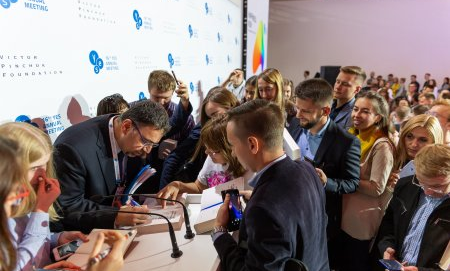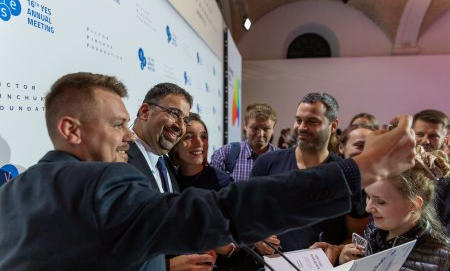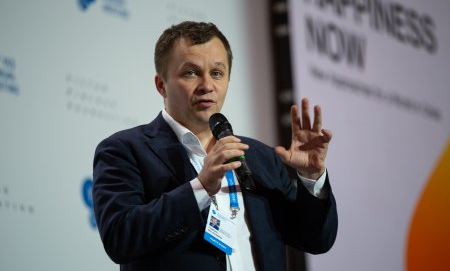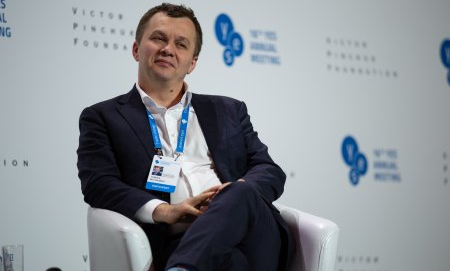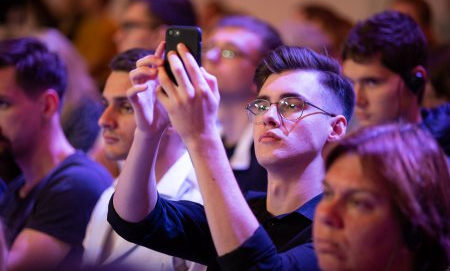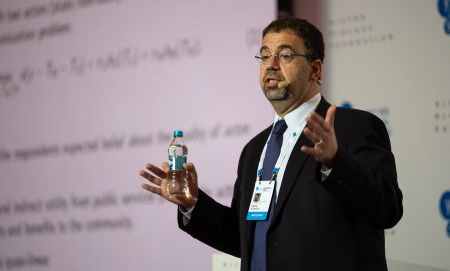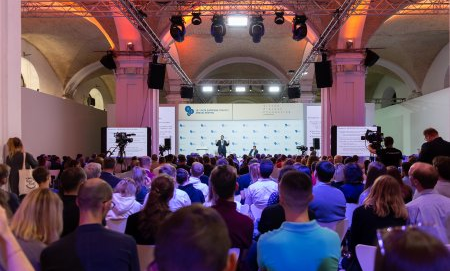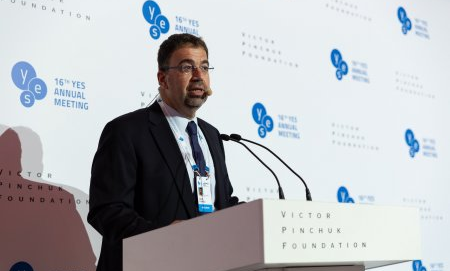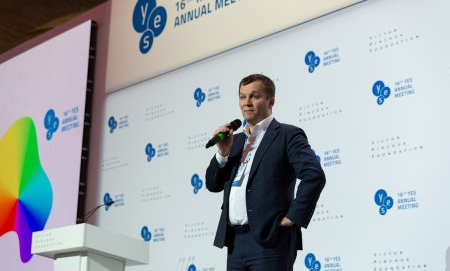Public Lectures: NEWS
Javier Solana and Strobe Talbott Discussed Global Challenges with Future Ukrainian Leaders
On Wednesday, March 31, former High Representative for Common Foreign and Security Policy of the European Union (1999-2009) and Secretary General of NATO (1995-1999) Javier Solana and the President of the Brookings Institution and former Deputy Secretary of State of the USA Strobe Talbott visited Ukraine upon invitation of the Victor Pinchuk Foundation. These leading experts on foreign policy and security came to Kyiv to take part in a public debate entitled Global Challenges: How Europe and the US Respond organized by the Yalta European Strategy (YES) and the Victor Pinchuk Foundation.
The event held at the Diplomatic Academy of Ukraine was attended by over 300 students, postgraduates and young scholars from the country's top universities. During the discussion its participants reflected on many crucial issues, such as Ukraine's place in the world, the future post crisis world order, the shift of centres of regional and global influence, climate change, foreign policy of the 21st century, stability of international security etc.
Victor Pinchuk: "Our Foundation sees promotion of the new generation in all domains of Ukraine's life as its key priority. For young people, for the students of the Diplomatic Academy and other higher education institutions, I believe, it is very important to meet such global leaders, such thinkers. This is a unique opportunity for the young generation to hear from their own lips about today's global problems and ask these most intelligent and prominent people questions."
Javier Solana: "We are living in a very complicated moment, a moment of a very complicated economic crisis which every country in the world is suffering. I cannot tell when the crisis will be over, but when it is over, the world will be very different from the world that we know today. There will be a new relation of forces in the world, changes and shifts in power from country to country, from region to region, and from a demographic point of view, there will be changes...We have global problems, problems that require cooperation of everybody to be solved. Global problems require global solutions. The problem that we have today is that we still do not have a sufficient sophisticated and capable institution that would be able to make a linkage between the global problem and the global solution. We need to have what might be called responsible interdependence. We are all interdependent. But now we have to be responsible interdependent. And every country has to assume that sense of responsibility in the global affairs in the world that we are living in today."
Talking about global challenges faced by the world, Strobe Talbott noted: "My own view is that the issue of issues in the century ahead is climate change. If we do not solve that problem, it does not matter how brilliant and successful we are in dealing with all the other problems that we face. Climate change is number one. Another issue is non-proliferation. We need to take a maximum advantage of what is distinctive about international relations in the 21st century. For the first time in human history, all the major powers in the world are at peace with each other and cooperate with each other. This gives us a potential to deal with even the toughest of the challenges..."
"The Copenhagen summit actually had a positive effect: it may be characterised as a useful disappointment. It showed that a process that had been going on for twenty years under the auspices of the United Nations bringing all the 92 countries on Earth together simply was not moving fast enough. I think the key leaders in Copenhagen moved away with a feeling that there has to be a new approach", - commented Mr. Talbott on the world's efforts to curb the climate change. "My own sense about the most promising way to change the process is to do more with fewer countries, and I might say, to do more with fewer political entities. And the four key political entities, I believe, are three states and the European Union - United States, China and India, plus the EU - to have them working as quickly and in as non-bureaucratic way as possible to come up with practical ways of addressing the problem. If you can make progress there, you can draw into the process a kind of concentred circles other key countries as we go along."
The theme of the lecture is topical for Ukraine too, as our country is in a constant search for its place on the global map, from a geopolitical point of view and with regard to its economic attractiveness and development prospective.
Strobe Talbott: "I would hope that as the private sector in Ukraine develops economic power, prosperity and capacity, it will also continue to use some of that capacity to strengthen civil society in Ukraine, to strengthen a philanthropic culture, to support education, public health, independent high quality impact, public policy research institutions, I think that will strengthen Ukraine as a society and will be good for everybody."
Having a direct dialogue between leading experts and Ukraine's new generation is an important contribution of the Victor Pinchuk Foundation to shaping responsible future leaders. These young people are our country's future political figures, businessmen and diplomats, who will be making shortly key decisions and will build and strengthen Ukraine's relationships with the world.
"I want to thank all of you for having listened to us and asking intelligent questions, and giving us the opportunity to answer them. I hope that these answers were helpful for you; they were said with honesty and frankness. We are mature people and we have talked frankly as friends", - said Javier Solana in his final address before the participants.
The Victor Pinchuk Foundation regularly invites internationally renowned economists, politicians and public figures to Ukraine to discuss today's challenges facing Ukraine and the world. Dr. Robert Engle, 2003 Nobel Prize Laureate; Dr. Francis Fukuyama, Professor of International Political Economy at the Johns Hopkins University; co-author of ‘Microeconomics' Dr. Robert Pindyck; James Wolfensohn, the ninth president of the World Bank Group; Muhhamad Yunus, 2006 Nobel Peace Prize Laureate and Colin Powell, the 65th US Secretary of State, have previously given public lectures.


